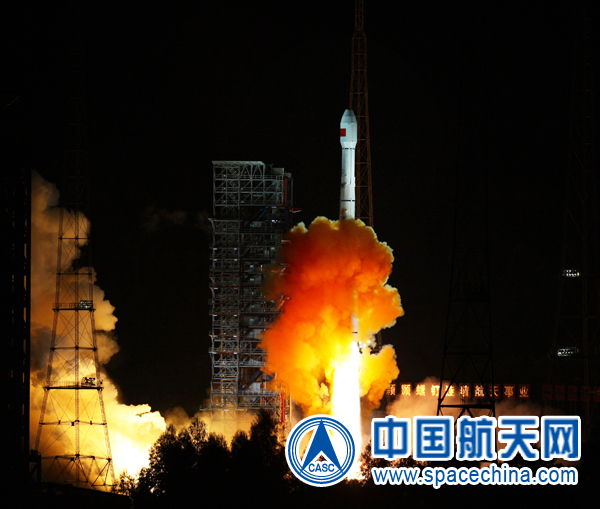China says moonbound rocket stage was not from 2014 lunar mission: report
Chang'e-5 T1 'completely burned up' in Earth's atmosphere shortly after launch, officials said.

China says a rocket stage set to slam into the moon on March 4 isn't from one of its missions, contradicting several recent reports.
Several independent observations suggest the rocket is from the Chang'e 5-T1 mission in 2014, following a misidentification that said the stage was part of a SpaceX Falcon 9 rocket that launched the Deep Space Climate Observatory satellite in February 2015. Yet officials at China's Ministry of Foreign Affairs now say the rocket for Chang'e-5-T1 was destroyed shortly after launch, according to SpaceNews.
"According to China's monitoring, the upper stage of the rocket related to the Chang'e-5 mission entered into Earth's atmosphere and completely burned up,” foreign ministry spokesperson Wang Wenbin said Monday (Feb. 21) on a Chinese government website, first spotted by SpaceNews.
Video: Rocket stage to slam into moon, seen by Virtual Telescope Project
Related: The greatest moon crashes of all time
If you spot the rocket stage in a telescope before it hits the moon, let us know! Send images and comments in to spacephotos@space.com.
Wang was referring to a test mission known as Chang'e-5-T1, a precursor to the more famous Chang'e 5 mission that brought a sample of the moon back to Earth in December 2020. Adding credence to the Chinese claim is tracking data from the U.S. Space Force's 18th Space Control Squadron showing that the Chinese rocket stage indeed re-entered the atmosphere in October 2015, SpaceNews said.
China has been criticized several times in recent years for its practices concerning space debris, most recently including the uncontrolled re-entry of a huge Long March 5B rocket in May 2021 that fortunately resulted in no casualties. In November 2021, debris from a Chinese anti-satellite test conducted in 2007 forced the International Space Station to make an evasive maneuver to protect the safety of its crew.
Wang emphasized that China is aware of international space standards concerning the removal of space debris, which can lead to in-orbit collisions or damage on the ground from larger objects re-entering the atmosphere.
Get the Space.com Newsletter
Breaking space news, the latest updates on rocket launches, skywatching events and more!
"China's aerospace endeavors are always in keeping with international law. We are committed to earnestly safeguarding the long-term sustainability of outer space activities and are ready to have extensive exchanges and cooperation with all sides," Wang added in the statement.

China's denial illustrates the difficulty of tracking objects in deep space after launch, and the latest findings from Space Force are not without controversy.
Astronomer Bill Gray, for example, told SpaceNews that Space Force is necessarily focused on objects that are close to Earth. (Space Force's mission, in part, is to offer United States "decision makers," as they term it, "military options to achieve national objectives.")
Gray has been widely credited with discovering the incoming moonbound object, whatever its origin. He published a blog post earlier this month explaining why he initially misidentified the object as coming from SpaceX and why he and other observers believe it is now from the Chinese rocket.
In an update to the blog post on Monday (Feb. 21), Gray said Space Force's tracking data is a "small mystery," but pointed out the tracking data so far provided is radar sightings from shortly after China's 2014 launch. Asteroid observers, by contrast, have sightings of that object from the past several years, he said.
"During much of that year [2014], the Chang'e-5T1 booster would have been well beyond the range of radar. So I very much doubt 18SPCS were actually tracking it," Gray said of Space Force's data.
Follow Elizabeth Howell on Twitter @howellspace. Follow us on Twitter @Spacedotcom or on Facebook.
Join our Space Forums to keep talking space on the latest missions, night sky and more! And if you have a news tip, correction or comment, let us know at: community@space.com.

Elizabeth Howell (she/her), Ph.D., was a staff writer in the spaceflight channel between 2022 and 2024 specializing in Canadian space news. She was contributing writer for Space.com for 10 years from 2012 to 2024. Elizabeth's reporting includes multiple exclusives with the White House, leading world coverage about a lost-and-found space tomato on the International Space Station, witnessing five human spaceflight launches on two continents, flying parabolic, working inside a spacesuit, and participating in a simulated Mars mission. Her latest book, "Why Am I Taller?" (ECW Press, 2022) is co-written with astronaut Dave Williams.









